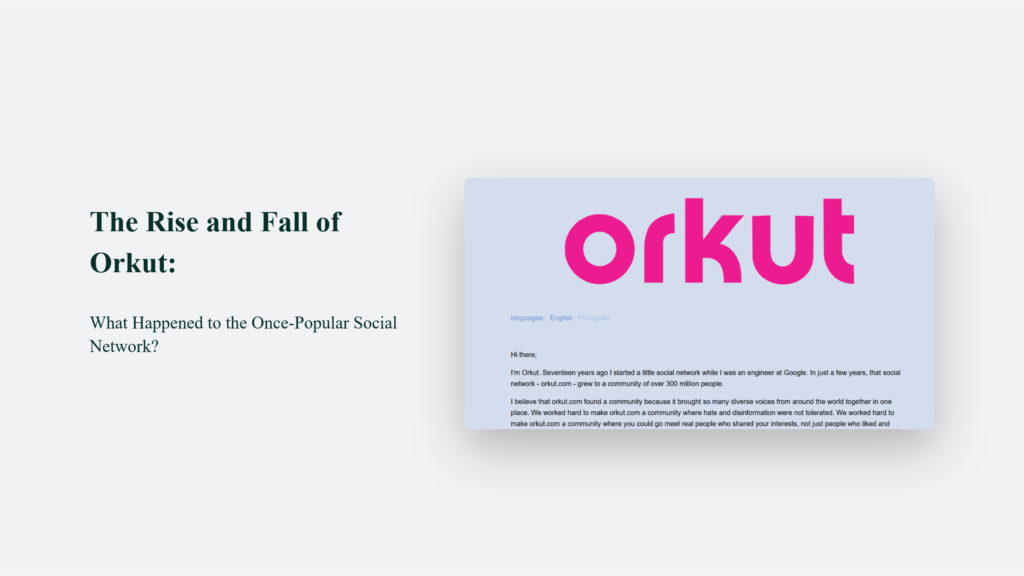

The Rise and Fall of Orkut: What Happened to the Once-Popular Social Network?

As Seen On
In the early days of social media, before Facebook and Instagram dominated, a pioneering platform captured the hearts of millions worldwide.
Orkut, named after its creator, Orkut Büyükkökten, was a trailblazer in online social networking. With its unique features and vibrant communities, Orkut quickly gained a massive following, particularly in Brazil and India.
However, as time passed, the once-thriving platform lost its lustre, eventually fading into obscurity. In this article, we’ll delve into the intriguing story of Orkut’s rise and fall, exploring the factors leading to its demise.

The Birth of a Social Media Pioneer
Launched in January 2004, Orkut was one of the earliest social networking platforms to gain widespread popularity. It was developed by Orkut Büyükkökten, a Turkish software engineer employed by Google. The platform aimed to connect people based on their shared interests and friendships. Orkut’s simple yet engaging interface, combined with its innovative features, quickly attracted users from around the globe.
Rapid Growth and Global Dominance Orkut experienced explosive growth in its early years, particularly in emerging markets such as Brazil and India.
By 2008, Orkut had over 100 million registered users, with Brazil alone accounting for more than half of its user base. The platform’s success in these countries was attributed to its ability to foster a sense of community and provide a space for users to express themselves freely.
The Decline of Orkut: What Happened?
Despite its initial success and popularity, Orkut began to lose ground to other social networking platforms in the late 2000s. This gradual decline can be attributed to several key factors highlighting the platform’s struggles to keep pace with the rapidly evolving social media landscape.
One of the most significant challenges Orkut faced was the intense competition from Facebook. As Facebook gained global popularity and expanded its user base, it began to attract users from other social networking platforms, including Orkut.
Facebook’s more advanced features, such as photo tagging, the News Feed, and third-party applications, provided users a more engaging and interactive experience. Additionally, Facebook’s broader reach and ability to connect users with friends and family worldwide made it a more appealing choice for many. As a result, many Orkut users began migrating to Facebook, seeking a more comprehensive and feature-rich social networking experience.
Another factor that contributed to Orkut’s decline was its lack of innovation. While other social media platforms constantly evolved and introduced new features to keep users engaged, Orkut struggled to keep up. The platform’s user interface remained largely unchanged over the years, and introducing new features was limited compared to its competitors. This lack of innovation made Orkut appear outdated and less attractive to users seeking fresh and exciting experiences on social media.
Security concerns also played a role in Orkut’s decline. The platform faced criticism for its inadequate privacy and security measures, which left users vulnerable to harassment, cyberbullying, and other online threats. Orkut’s communities, once a key platform feature, became breeding grounds for spam, fake profiles, and inappropriate content.
The platform’s moderation and reporting mechanisms often failed to address these issues, leading to a decline in user trust and satisfaction. As users became increasingly concerned about their online safety and privacy, they began to seek out platforms that offered better protection and more robust security features.
Finally, shifting user preferences and emerging new social media trends contributed to Orkut’s struggle to maintain relevance. As smartphones and mobile devices became more prevalent, users began to demand social networking experiences optimised for mobile platforms.
While Orkut introduced a mobile version of its platform, it failed to gain significant traction among users who are increasingly turning to mobile-first platforms like Instagram and Twitter. The rise of niche social networks and messaging apps, such as LinkedIn and WhatsApp, further fragmented the social media landscape, making it harder for Orkut to compete and retain its user base.
The decline of Orkut serves as a reminder of the dynamic and competitive nature of the social media landscape. The platform’s inability to innovate, address security concerns, and adapt to changing user preferences ultimately led to its market share and relevance loss. As users flocked to platforms that offered more advanced features, better security, and a more engaging experience, Orkut’s once-dominant position in the social media space eroded, paving the way for its eventual shutdown in 2014.
The Final Curtain: Orkut’s Shutdown

In June 2014, Google announced that it would be shutting down Orkut, the once-beloved social networking platform. The decision surprised many, but it was not entirely unexpected, given the platform’s steadily declining usage in recent years. Google cited several reasons for the shutdown, primarily focusing on prioritising resources and shifting attention to other projects that showed more promise and growth potential.
For Orkut’s remaining user base, the news of the impending shutdown evoked mixed emotions. Some users expressed deep nostalgia for the platform that had been a significant part of their online lives for years. Orkut was the go-to platform for connecting with friends, joining communities, and expressing oneself, particularly in Brazil and India, where it had once reigned supreme.
The announcement brought back memories of the countless hours spent interacting with others, sharing thoughts and experiences, and forming lasting friendships through the platform.
On the other hand, many users had already migrated to other social networking platforms, such as Facebook and Twitter, which offered more advanced features and a larger global reach. For these users, the news of Orkut’s shutdown was met with acceptance, acknowledging that the platform had run its course and that it was time to move on.
Before the platform officially closed, Google provided users a three-month window to export their data, including profile information, photos, and testimonials. It allowed users to preserve their memories and connections on Orkut, ensuring their digital footprint would not be lost forever.
As the September 30, 2014 countdown began, Orkut users took to the platform to bid their final farewells. Heartfelt messages, nostalgic posts, and expressions of gratitude flooded the platform as users reminisced about the good times they had shared on Orkut. Communities that had once thrived on the platform organised virtual gatherings and events to celebrate their time together and to create lasting memories before the final curtain fell.
On September 30, 2014, after a decade of existence, Orkut officially ceased operations. The once-vibrant platform, which had connected millions of people across the globe, became a part of social media history. Users who attempted to access Orkut were greeted with a message thanking them for their support and directing them to other Google services.
The shutdown of Orkut marked the end of an era in social media history. It was a testament to the ever-evolving nature of the digital landscape, where platforms rise and fall based on user preferences, technological advancements, and market trends. Orkut’s decline and eventual closure highlighted the importance of adaptability and innovation in changing user demands and fierce competition.
While Orkut may no longer be accessible, its impact on social media cannot be overlooked. The platform played a significant role in shaping the early days of online social networking, particularly in emerging markets. It paved the way for future platforms to prioritise user engagement, community building, and the power of connecting people across borders and cultures.
As we look back on Orkut’s rise and fall, we are reminded of the fleeting nature of digital platforms and the importance of cherishing the connections and memories made along the way. Orkut’s legacy lives on through the countless friendships forged, the communities built, and the experiences shared during its decade-long existence. Although the platform itself may have ended, the spirit of connection and interaction it fostered continues to thrive in the ever-evolving world of social media.

Orkut’s Legacy and Impact
Although Orkut may no longer be active, its impact on the social media landscape must be considered. The platform played a significant role in shaping the early days of online social networking, paving the way for the giants we know today. Orkut’s emphasis on community building and user engagement set the stage for future platforms to prioritise these aspects.
Moreover, Orkut’s popularity in countries like Brazil and India highlighted the potential for social media to connect people across borders and cultures. The platform’s success in these markets demonstrated the global appeal of social networking and its ability to foster a sense of belonging among users.
Conclusion:
The story of Orkut is one of meteoric rise and gradual decline. From its humble beginnings as a pioneering social networking platform to its eventual shutdown, Orkut left an indelible mark on the history of social media. While it may no longer be active, the lessons learned from Orkut’s journey continue to shape the evolution of online social networking.
As we reflect on what happened to Orkut, we are reminded of the ever-changing digital landscape and the importance of adapting to users’ needs and preferences in an increasingly connected world.
Frequently Asked Questions:
When did Orkut shut down?
Google announced the shutdown of Orkut in June 2014, and the platform officially ceased operations on September 30, 2014, after a decade of existence.
Why was Orkut so popular in Brazil and India?
Orkut gained immense popularity in Brazil and India due to its early adoption in these countries and its ability to provide a platform for users to express themselves and form communities. The platform’s simple interface and engaging features resonated well with users in these emerging markets.
What was Orkut?
Orkut was a social networking platform launched in 2004 by Google employee Orkut Büyükkökten. It allowed users to connect with friends, join communities based on shared interests, and interact with others through features like messaging and testimonials.
Konger
Up until working with Casey, we had only had poor to mediocre experiences outsourcing work to agencies. Casey & the team at CJ&CO are the exception to the rule.
Communication was beyond great, his understanding of our vision was phenomenal, and instead of needing babysitting like the other agencies we worked with, he was not only completely dependable but also gave us sound suggestions on how to get better results, at the risk of us not needing him for the initial job we requested (absolute gem).
This has truly been the first time we worked with someone outside of our business that quickly grasped our vision, and that I could completely forget about and would still deliver above expectations.
I honestly can't wait to work in many more projects together!
Disclaimer
*The information this blog provides is for general informational purposes only and is not intended as financial or professional advice. The information may not reflect current developments and may be changed or updated without notice. Any opinions expressed on this blog are the author’s own and do not necessarily reflect the views of the author’s employer or any other organization. You should not act or rely on any information contained in this blog without first seeking the advice of a professional. No representation or warranty, express or implied, is made as to the accuracy or completeness of the information contained in this blog. The author and affiliated parties assume no liability for any errors or omissions.

